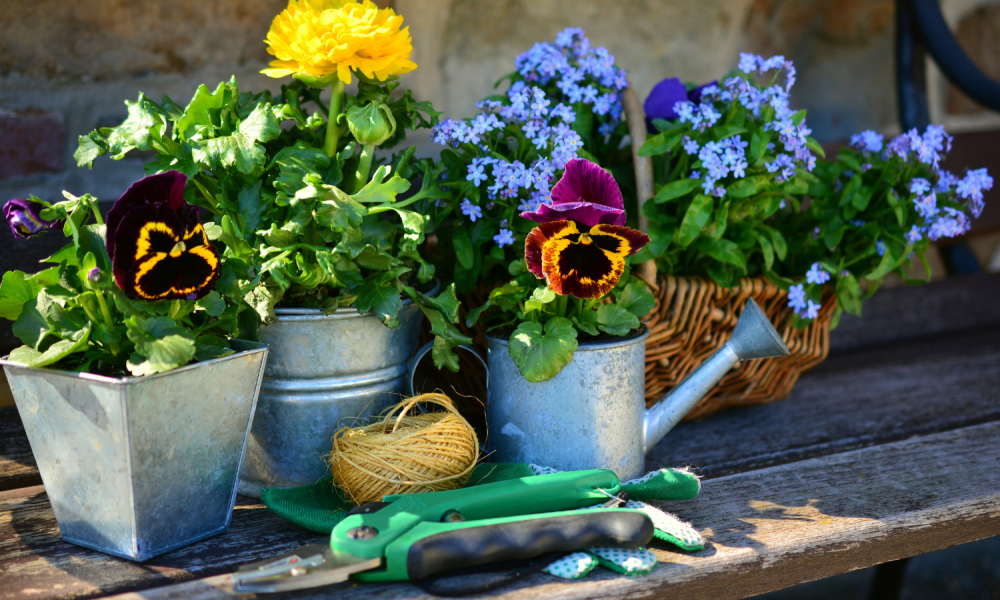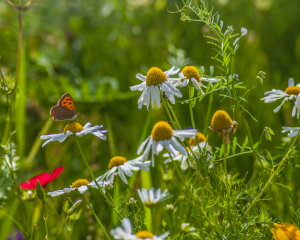Worried about climate change? Here are some tips for helping nature in your area

Green Party representative Lauren Tuite shares tips on how to create space for nature that renews our connection with the living world and makes us happier, healthier, and more able to tackle the climate and biodiversity crises we face.
It can be hard to think about nature right now. We are still recovering from – and for some still experiencing – the reality of a pandemic. We are also watching with horror a devastating war being fought in Ukraine. But sometimes against a backdrop like that, finding areas we can affect change is an important step not just for the planet but for ourselves.
I want to take you back to a video you may have seen recently – of a digger tearing down a lonely hedgerow tree. Soundtracked by the distress of school children witnessing the spectacle, it demonstrated a sad reality: Ireland has become a hostile place for nature.
Like a lot of people, I feel these moments of loss acutely. Whether it’s a felled tree in a neighbour’s garden, or a wild area by the canal tamed into lifelessness, a simple walk can feel like a lamentation.
But what community action has taught me is that we can still turn things around. We can create space for nature that renews our connection with the living world and makes us happier, healthier, and more able to tackle the climate and biodiversity crises we face.
The campaigns I’ve worked on – planting fruit trees and saving mature trees from road widening projects – might be small efforts but they’ve helped change the conversation, even just locally, about the importance of nature.
And this is work anyone can do, which is great because we need everyone to do it! No matter what your background or knowledge level, you can help.
Here are my top five pieces of advice for ways to become an advocate for nature in your local area.
Find your tribe
Working to change the status quo is hard and requires persistence; having allies is important for your mental health and to increase your chance of success in the long term.
The good news is you’ll find nature lovers everywhere: in residents committees, tidy towns groups, schools and sports clubs and even local Whatsapp and Facebook pages.
Getting linked up can be as easy as making a post asking how to get involved locally. If there’s nothing going on in your area, perhaps you’re the person to get it off the ground?
I’m involved in one tree planting initiative that started as a question just like that in a Whatsapp group and in under two years we’ve planted some 150 trees, lobbied for planters and benches, and shared seeds and plants and knowledge and the burden of caring for nature.
There’s a famous quote that the penalty of an ecological education is to “live alone in a world of wounds”. Find your tribe and you share the labour of healing.
Walk, cycle, and take public transport
For too long, the cost of car dependency in modern Ireland was absorbed by nature. Car culture bisected habitats, covered great swathes of land in concrete and tarmacadam, and converted vital city gardens into driveways.
Travelling by private cars has also reduced the time we have to pay attention to our local areas – to notice and appreciate the slivers of life we could be nurturing and connecting up into ecological corridors for insects and other pollinators.
As pump prices skyrocket, we realise how vulnerable and isolated we have made ourselves by relying on cars to get around. But the data shows half of all journeys in Ireland under 2km – about a ten-minute walk – are made in a car, and almost 40% of transport emissions are produced by journeys under 8km.
These are distances many more people could be travelling by foot or bicycle if they were supported with safe, accessible, and comfortable footpaths and cycle lanes. I know this is not possible for everyone but for all those who can, give it a go.
In short, one of the most meaningful things we can do for nature is to travel in a sustainable way and/or advocate for that investment to be made in our communities, which takes me to my next point.
Get to know your local councillors
Plug your address into the website whoismytd.com to instantly identify your councillors, TDs and MEPs. In my experience, local reps are delighted to hear from individuals and groups with defined asks that they can help progress through the local authority.
Planting greenspaces for biodiversity, changing the mowing routine, and creating pollinator plans are all within the scope of your local authority’s competency. If you don’t have a project in mind, you could ask councillors, “what are you doing to help nature and biodiversity in your area?”
This is not to catch people out, but to create a culture where everyone, of all political persuasions, understands we have a responsibility to care for the environment.
Respond to public consultations
There is a dizzying array of live public consultations at any time, on topics like housing projects, large infrastructural plans, and developing government policies. These are generally structured to be user friendly and can be completed in as much detail as you wish.
My residents’ association has spent a lot of time engaging with Busconnects for Inchicore and provided alternatives to road widening and mature tree felling that were accepted by the National Transport Authority.
We’ve made similar submissions to Dart+ and the Emmet Road Regeneration Project to advocate for people-friendly and nature-friendly design.
Too often, public consultations are overwhelmed by objections and fear of change, but they can be great opportunities to make better provisions for nature and wildlife.
No spray zones
And to my final point, advocating for nature is often seen as costing more. Well sometimes it means spending less!
I can’t think of a worse way to spend your hard-earned cash than on pesticides. Irish pollinators have had their homes and food supplies destroyed, perhaps unwittingly, by development.
To purposefully poison our native bees is an act of self-sabotage and it’s hurting our ability to grow Irish produce.
In my opinion lawns look fabulous dotted with sunny dandelions, docks, and clover. Let them grow and enjoy the winged visitors feasting in your patch.
Look this stuff is daunting. There can be moments of setback and it’s important to acknowledge that and not beat yourself up. I can honestly say for me getting involved has made climate action more rewarding and less lonely – with new and deeper connections to people and place.
And every friendly face I meet out walking erases a hundred anonymous comments on Twitter – win! So, leave the mower in the shed, take a walk, admire a tree, talk to your neighbours, and start the journey to becoming a nature advocate.
This article was originally published in The Journal on March 18th, 2022.

Protecting nature
The Green Party in government is driving unprecedented supports to address the biodiversity crisis including an ambitious afforestation plan and a citizen's assembly on biodiversity. We are striving to restore our natural systems and make space for nature to flourish.


